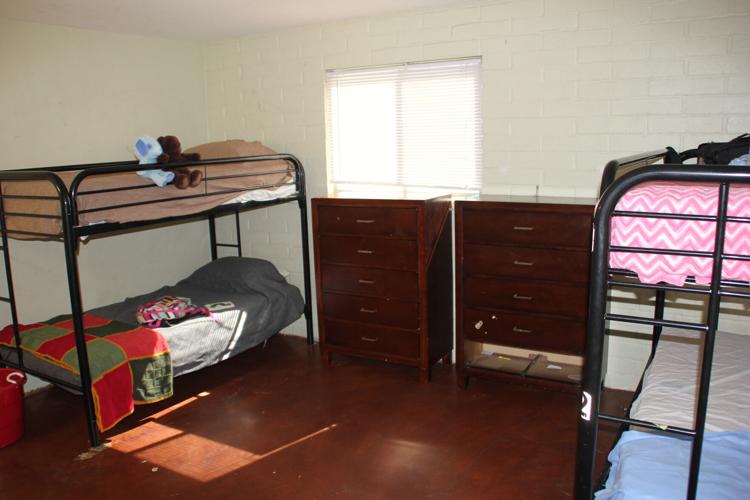Augustina "Tina" Soto met Stephen J. Malone in high school, when she was a sophomore and he a senior.
The pair quickly fell in love and began planning a future together, accelerated when Soto became pregnant at 18.
The young couple did the best with what they had, and Soto's aunt, Rachel Tineo, said Malone treated Soto well. At first.
But that didn't last, and Soto left Malone several years later because of his abuse, taking their three children with her. Malone had threatened her life more than once if she ever tried to leave. She confided in Tineo that she had not believed she would make it out of the relationship alive.
And as it turns out, she didn't.
Malone gunned Soto down in front of two of their three kids and her sister on June 11, 2013. She had stopped by Malone's mother's house to pick up some food purchased for the kids, and he chased her car down.
After Soto's death, Tineo sought out help to deal with the loss.
She found the Emerge Center Against Domestic Abuse, a local nonprofit that assists victims of domestic abuse and their loved ones. She said she believes Emerge's services — which include emergency sheltering for victims and their children in a secure location with a staff-supported safety plan — could have saved her niece's life.
Today, Emerge is getting ready to enhance its ability to help women like Soto by expanding its shelter capacity with a multimillion-dollar investment by Pima County, Tucson and an anonymous donor.

Tina Soto's family members march with her picture during the 32nd annual All Souls Procession in Tucson on Nov. 7. Soto was shot to death by her boyfriend in 2013.
Communal setting
wasn't optimal
The $3 million in funding — which includes $2 million of federal funds from the county and city — will pay for the renovation and expansion of the shelter, which currently has space for 13 families or 51 people.
The anonymous donation was made in honor of the Connie Hillman Family Foundation, a nonprofit in Tucson that gives to various causes.
Pre-pandemic, the emergency shelter was 100% communal. Each bedroom had two sets of bunkbeds and could hold up to four people, who all shared an adjoining bathroom with four other people.
While families were able to room together, they also often had roommates, as did survivors who came to the shelter without children. A single kitchen and dining area in the facility served all residents, who participated in community meals.
"In order to maximize the people we can help, we're playing Tetris to try to fit as many configurations of families in those rooms," said Emerge CEO Ed Sakwa, recalling those days.
From the perspective of trying to better support survivors' needs, "it was not good," he added. "You've got people who are in crisis who have experienced trauma, who now have no privacy and who are sharing space with strangers who have also gone through trauma."
Moreover, the pandemic made it impossible for Emerge to continue to use the space, as shelter staff and residents were unable to mitigate the spread of the coronavirus in a communal setting.
Some survivors chose to stay in their abusive households because it felt safer than the risk of contracting COVID-19 at a shelter, Sakwa said.

Since July 2020, all those needing emergency shelter services have been sent to a temporary, undisclosed location. The temporary plan is safe, but it's hard to operate a shelter out of someone else's business, and there's no space that would allow survivors to gather while maintaining safe social distancing.
"There's still a need for some space for community for people to get support and build connections," Sakwa said.
It's also incredibly expensive, and not financially sustainable, to rent space, he said.
"The next step was, how do we not have to go back to the communal that we know was never good and certainly wasn't COVID-good, and be able to have a cost we can afford over time?" Sakwa said.
That's where the $3 million in funding came into play. It will allow Emerge to expand the existing space to 28 individual units — each with a bedroom, bathroom and kitchenette — that will hold individual families on their own, with one family per room.
The newly designed shelter, which Sakwa said is more than a year away from being completed, will house up to 78 residents.
"It'll be this nice balance of 'you can retreat to your private living space but you can also have gathering spaces for the community of the shelter'," Sakwa said.
Threats keep
them at home
When Tina Soto and Stephen Malone had their first child, Soto planned to have a career and work while raising her family. But two children in quick succession and Malone's discharge from the military changed those plans. Soto ended up working to support the family while Malone attended college.
In the spring of 2013, Malone's graduation was on the horizon and their youngest child was about to turn 4. By that time, the abuse had already been going on for years, according to Soto's aunt, Tineo. Up until that point, however, Malone's physical assaults on Soto were random and spontaneous, and she kept it hidden from her family.
But when Soto discovered that her youngest child had picked up her phone and inadvertently recorded video of one of Malone's attacks, she knew she had to get herself and her children out.
"She didn't want her girls growing up thinking it's OK to be abused," Tineo said. "But part of the reason she stayed so long is because the threats are real."
Many victims stay in their abusive situations because of threats that if they leave, they'll be killed, Tineo said. That's part of the reason Emerge's ability to safely house as many people as possible in its secure facility is so important.

A multimillion-dollar investment by Pima County, Tucson and an anonymous donor will allow the Emerge Center Against Domestic Abuse to expand. In its new configuration it will have 28 individual units, with one family per room.
Emerge has been using federal COVID relief funds to house survivors in the temporary facility, but those funds will run out in February.
Because of the lapse in time between the money running out and the completion of the new shelter space, the anonymous donor has issued a fundraising challenge to the community to help Emerge raise $2 million to cover operations.
"It's one thing to build the building, but we've got to (operate) until it's done. And then once we move in, we're now going to have a bigger facility with more operating costs," Sakwa said.
He is hoping the community will rally behind the need for the new space and help Emerge raise the funds.
"Even before the current (situation), we would use temporary noncongregate housing as overflow," Sakwa said. "We were often overfilled. As of today, we've got 70 people in shelter."
"Every indicator is that the amount of abuse went up (during the pandemic,) but people's ability to reach out to places like Emerge decreased," Sakwa said. "We're actually now at a higher call volume than pre-pandemic."
From July 1, 2020, to June 30, 2021, there were more than 7,000 calls to Emerge's multilingual hotline.
Emerge is now getting 25 calls a day to the hotline on average, up from 20 a day pre-pandemic, Sakwa said.
"Some portion of those folks ultimately end up needing shelter or getting shelter. It really does matter to have as much space as we can," he said. "And way beyond quantity is the quality piece. What's the experience they're having? Is it supportive of their healing?"
Survivors will be able to better focus on taking care of themselves and their children if they're not worried about getting along with a roommate, Sakwa said, adding that the communal living situation has been a major challenge for survivors and staff.
'People, not
numbers'
Pima County has long had a partnership with Emerge, providing funding each year to support operations and also for medical forensic exams and interviews of victims of sexual assaults, said Paula Perrera, director of the county's behavioral health department.
When Emerge approached county officials with its expansion proposal, the timing was right, she said.
"It all kind of aligned perfectly so that the county had the ability and the resources, to help support that remodel," Perrera said. "It's basically doubling the capacity that Emerge has in terms of the number of people that they can serve," and that will be "a permanent thing into the future."
The county will use American Rescue Act funds to cover its $1 million. The city will also use federal funds, although it's unclear if they'll be pandemic-related.
Sakwa said he hopes knowing about the need for a larger shelter will help people realize that domestic violence isn't a private matter.
"We cannot provide services as a way out of this situation and we can't arrest our way out," Sakwa said. "It's about prevention and social change."
Tucson police and the Pima County Sheriff's Department respond to nearly 15,560 domestic violence-related 911 calls each year at a cost of more than $6.1 million annually. Roughly 15,000 people are arrested in connection with domestic violence each year, says the Pima County Attorney's Office.
This doesn't include the countless victims who are unable to call 911 about the emotional, psychological or other forms of abuse they endure, Sakwa said.
"These are people, not numbers," Sakwa said.
Rachel Tineo hopes that people remember her niece, Tina Soto, as a mother, sister, daughter, friend and amazing woman. Not just a statistic.
"Chances are she would have been able to survive this, if she'd been able to get the services Emerge provides and work on the trauma from her abuse and get to safety," Tineo said. "We didn’t know what we didn’t know at the time, and now that I do, it's my lifelong mission to seriously educate everyone to know what we didn’t know."
Malone was convicted of first-degree murder in 2016 and is serving a life sentence in prison in connection with Soto's death.
Tineo serves as a board member for Emerge and shares her niece's story with the hopes it will educate the public about the dangers of domestic violence, but also the wealth of services available to women or men and their family members, including the emergency shelter.
"No one should be dying from domestic violence. We have got to quit sweeping it under the rug and saying, 'It's happening behind closed doors and it's not my business,'" Tineo said. "When your loved one dies, that's your business. I don't want people to be in the 'club' that I'm in."






